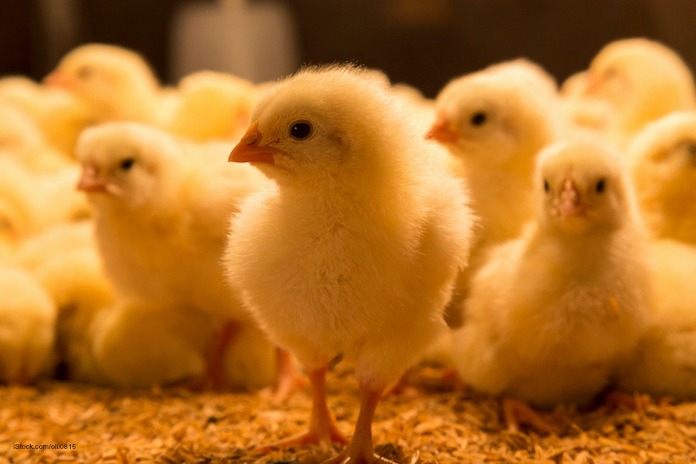The CDC reports that there are eight ongoing multistage outbreaks of Salmonella linked to backyard poultry in the United States. In the June 2017 issue of the CDC’s Morbidity and Mortality Weekly Report, an outbreak advisory discusses the 2017 multistate outbreak of human Salmonella infections linked to live poultry in backyard flocks.

Every year Food Poisoning Bulletin has told you about outbreaks linked to backyard poultry. Hundreds of people have been sickened in these types of outbreaks. Chickens, turkeys and ducks can carry pathogenic bacteria that can easily be transmitted to humans.
As of May 25, 2017, there are 372 people infected with the outbreak strains of bacteria in 47 states. The serotypes in these outbreaks are Salmonella Braenderup, Salmonella Enteritidis, Salmonella Hadar, Salmonella I 4,[5],12:i-, Salmonella Indiana, Salmonella Infantis, Salmonella Mbandaka, and Salmonella Typhimurium.
Illnesses started on dates ranging from January 4, 2017 to May 13, 2017. Seventy-one patients have been hospitalized. No deaths have been reported. Thirty-six percent of ill persons are children under the age of 5.
Epidemiologic, traceback, and lab findings link the eight outbreaks to contact with live poultry, including chicks and ducklings, that come from several hatcheries. In interviews, 190, or 83%, or 228 ill persons interviewed said they had contact with live poultry the week before they got sick. The live baby poultry were purchased from several sources, including feed supply stores, websites, hatcheries, and relatives.
These animals can look healthy and clean but can still carry Salmonella bacteria. As more people start keeping backyard blocks, these outbreaks have increased. In 2016, there were a record number of illnesses linked to backyard poultry. In those outbreaks, 895 people were sickened in 48 states. Three patients died, and 209 were hospitalized.
If you choose to keep poultry, follow some basic rules to keep yourself and your family safe. Always wash your hands with soap and water right after touching live poultry or anything in the areas where they live and roam. Wash your hands after handling clothes and shoes that have touched live poultry. And supervise hand washing for children.
Do not let poultry live in the house, especially in areas where food and drink are prepared. Do not eat or drink in the areas where the birds live or roam.
Children under the age of 5, the elderly, and people with chronic illnesses or weakened immune systems should not handle or touch chickens, ducklings, or other live poultry. People in those groups are more likely to become seriously ill with a Salmonella infection. Do not snuggle or kiss the birds, touch your mouth, or eat or drink around live poultry. Watch children when they are around the birds. These animals are cute, but can harbor pathogenic bacteria.
If you collect eggs from hens, wash your hands with soap and water after handling the eggs, chickens, or anything in their environment. Collect eggs often, since eggs that remain in the next can break or get dirty. Throw away cracked eggs. Always refrigerate eggs immediately after collection.
You can clean eggs with dirt or debris with fine sandpaper, a cloth, or a brush. Don’t wash eggs, because cold water can pull bacteria into the egg. Always cook eggs thoroughly. Raw and undercooked eggs can contain Salmonella bacteria.




